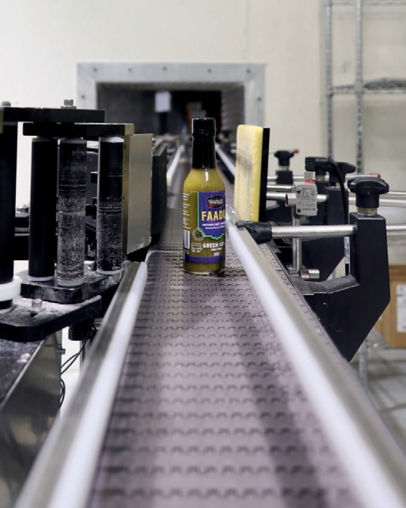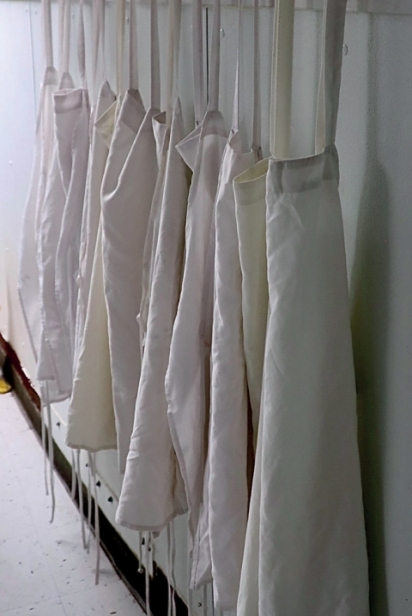From Concept to Shelf
Co-Packing Businesses and Accelerators Help Food Entrepreneurs Grow their Businesses
A few years ago Amit Makhecha was having a conversation with a counselor from the Michigan State University Product Center about his business, M&R Ventures.
“I said, ‘It’s so frustrating that it’s taken me six years to get my product to a shelf,’” he recalls of the state of his family business, which started creating Indian food products, such as chutneys, after the family of restaurateurs got out of the restaurant business. “‘Why does it have to be so painful? Why can’t there be a more efficient way to do this?’” That led him to consider “how it’d be great if I could start something where I could help people avoid some of the mistakes I’ve made.”
They went through five different copackers— facilities that produce and package products for other food businesses in addition to their own—but Makhecha says it didn’t work out for a variety of reasons, with cost being the primary one. There were also issues of production.
“We were able to make our product but we couldn’t automate. … You can’t set up a bottling line in the restaurant kitchen,” he says. That’s when he heard about FEAST Detroit, a project being developed by Eastern Market and the Michigan State University Product Center. The accelerator offered “tremendous improvement in efficiencies,” and his company went from making 500 or 600 bottles a day at the most to “thousands in a day at a lower cost.”
Today, Makhecha is one of the co-founders of FEAST Detroit, which co-packs products for about 24 food businesses at the moment. Established in 2017, the Inkster-based 16,000-square-foot specialty food manufacturing facility offers co-packing services to food businesses creating shelf-stable products.
Helping food businesses scale up is “the driving factor” for Makhecha.
“That’s our vision. We just want to help people. There just has to be a better way to get information out to people so they don’t spend a lot of costly time and energy,” he says. “We shouldn’t have to reinvent the wheel every time.”
For small food entrepreneurs without the capital to produce their own products, co-packers are an option to get their products out to market. At FEAST, they help producers from concept to shelf.
“Southeastern Michigan has a very good ecosystem for incubating and helping small companies start off,” says Makhecha, pointing to support he found learning about the cottage industry law, access to shared-use kitchens with Detroit Kitchen Connect, and other resources related to the MSU Product Center and the Michigan Good Food Fund. “But not so much for scaling.”
And if a producer is able to get orders from retailers to put their product on their shelves, then it’s a “scramble” to make the product efficiently and to scale.
“You could either set up your own production facility with automation— and that would cost a lot of money—or you could go to a traditional co-packer,” he says. What makes FEAST different is the flexibility to produce smaller minimum runs than traditional co-packers, Makhecha says.
“So there was that missing gap in that ecosystem: How do you scale up? A lot of companies went out of business, not because they had bad products but because they just weren’t able to scale up.”
One local food business that has grown steadily is Mrs. Pruitt’s Gourmet Cha Cha, which started co-packing with Pronko Enterprises in 2014.
Linda Kay Pruitt, founder of Mrs. Pruitt’s Gourmet Cha Cha, says she had looked into other co-packers to produce and package her 16-ounce products and ultimately went with Pronko because owner Alan Pronko worked closely with MSU’s Product Center and she felt comfortable with him.
“Alan is really up-to-date in terms of requirements and guidelines regarding the product,” she says.
Recently she’s started working with FEAST to make Mrs. Pruitt’s Gourmet Cha Cha 8-ounce Motor City Turbo Heat and Motor City Super Charge, as well as a seasoning blend.
For the past year or so, she’s considered packaging on her own. As a master gardener with two gardens at home, she doesn’t have any problem growing vegetables like peppers and tomatoes—key ingredients for cha cha, a staple in African-American cuisine. But for Pruitt, her growing pain is a space to grow the vegetables for her product.
“I have been working with trying to find space in Detroit to grow my own food: green tomatoes and peppers. If I could do that, I don’t think I’d have any problems preparing, packaging or labeling my products,” she says.
Until she can find a space of her own, co-packing is the way to go for her business.
“Co-packing, especially if you get with a really good co-packer that knows what they’re doing, is the way to go get your product out there. Because it saves time,” Pruitt says.
The pandemic slowed down momentum for facilities like FEAST.
“We were growing fairly steady till 2019,” Makhecha says. “Last year, we actually lost ground, which was disappointing, because our projections were that we would grow another 15 to 20%.”
Things are starting to look up a bit more this year and Makhecha says next year could be the year that FEAST gets to profitability.
“We’re expecting to be able to break even this year, or get to that point by the end of the year next year to actually start making a profit.”
And beyond that, the vision is to build more FEAST facilities in cities in Michigan and beyond.
“For local food to stay local, there will have to be local co-packers,” Makhecha says.
“We’re very excited about how local food is starting to take on much more of a dominant position in people’s minds,” Makhecha says. “It may not be in dollars and cents just yet. But more and more people are starting to realize the value of buying locally and COVID did, in that sense, do wonders. People start to realize that something from other countries, something different from a different part of the country, could get disrupted very easily, whereas if it’s local, disruptions are going to be minimal. You’re supporting your community, you’re buying local.”
For more information, visit feastdetroit.com.






